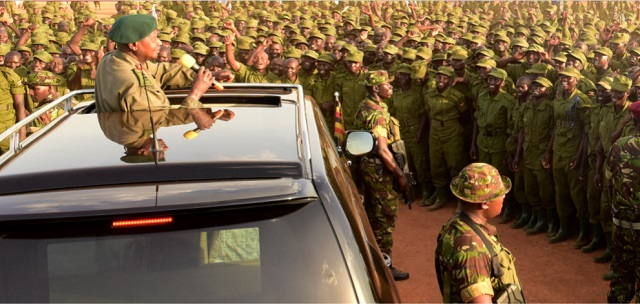
Rwanda tension
The doubling of the defence might not come as a surprise; especially for those following tensions between Uganda and Rwanda closely.
Rwanda escalated tension in late February when it introduced new stiff guidelines at its border with Uganda at Gatuna. Uganda’s Foreign Minister, Sam Kutesa, explained that Rwanda has imposed a trade embargo and ordered a raft of high cost and non-tariff barriers.
The Rwanda move saw Kenyan President Uhuru Kenyatta travel to both Kigali and Kampala on March 11 to meet with Museveni and Rwandan President Paul Kagame as part of diplomatic efforts to calm tensions.
Despite these efforts, however, Uganda and Rwanda are said to have armies on standby, and recruiting and training more. Both Museveni and Kagame have recently been seen spending time with their armies.
While addressing a National Leadership Retreat (commonly known as Umwiherero) at Gabiro in Kigali recently, President Kagame said the tensions with Uganda could mean reallocating more resources to defence.
Insiders say Uganda is increasing its defence spending in the face of the likelihood of a war with Rwanda.
But Museveni has always wanted to be seen as the military giant of the region. He has wanted a strong well-equipped army ever since his government formulated its security policy in 2001.
Initially, Museveni needed to defeat the Joseph Kony Lord’s Resistance Army (LRA). Then he entered Somalia to fight against the al Shabaab. But he has also been in competition for regional military superiority with; especially Kenya. But he has feared being caught unprepared by spill-over of war in South Sudan and Sudan, and now Rwanda.
Part of the reason, some experts say, is that President Museveni has been keen to be seen as a major player in pacifying the reason.
But the other is that he has been keen to keep the UPDF in battle in order to keep the soldiers busy while improving their experience and resources. Between 2012 and 2013, Uganda reportedly ordered new batches of weapons, including tanks and ant-tank missiles.
As a result of Museveni’s efforts, observers say, the UPDF has been chiseled into a modern fighting machine with proper systems. There have not been reports of ghost soldiers on the payroll and in recruitment, promotion, deployment, and procurement are said to be professionally handled.
Officers in specialised units such as artillery, armored and air defense, have undergone a lot of training locally and abroad. The units have also been reinforced with personnel and modern equipment.
Most of the training happens at the Senior Staff and Command College at Kimaka in Jinja. Previously training of officers was slow because Uganda was sending one or two officers a year to command and staff colleges in Ghana, USA or UK. With Kimaka, the country can output 40 officers a year, sources say.
The UPDF leaders say increased professionalism; including deploying right officers in the right command positions, has led to increased operational effectiveness.
The UPDF was able to break the back of the Joseph Kony Lord’s Resistance Army (LRA) rebellion in Northern Uganda, and deploy peace-keeping and stabilization forces in Somalia and South Sudan.
Also, as a result of these deployments, Uganda’s military proved to be double-blessing for Museveni; keeping Museveni as a strategic ally of the U.S in the war against terrorism and earning him dollars.
Under the United Nations and African Union peacekeeping agreements, troop-contributing countries are reimbursed if they deploy with their own equipment, both lethal and non-lethal under an arrangement named reimbursement of Contingent Own Equipment (COE).
At some point Uganda was being reimbursed up to US $7million and the U.S. has severally donated equipment to the Ugandan military.
These handouts have in turn allowed President Museveni to use some of the money budgeted for the army to fund his politics.
 The Independent Uganda: You get the Truth we Pay the Price
The Independent Uganda: You get the Truth we Pay the Price



